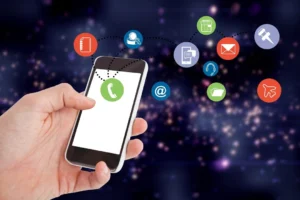In the realm of customer communication, chatbots have become an essential tool for businesses. But when it comes to deciding between a WhatsApp chatbot and a web chatbot, the choice can feel a bit tricky. Both have their strengths and depending on your business model, one might serve you better than the other. Let’s dive into the details, break down the pros and cons, and help you make the best decision for your business.

What Exactly Is a Chatbot?
At its core, a chatbot is a piece of software designed to simulate conversations with users. It uses algorithms, machine learning, or rule-based logic to interact with users, offering a streamlined way for businesses to handle inquiries, sales, support, and more.
Chatbots serve as a bridge between technology and customer experience. They take the pressure off human agents, allowing businesses to respond to multiple customer queries simultaneously, automate repetitive tasks, and offer a more consistent communication experience.
There are various types of chatbots available, from basic question-and-answer bots to complex systems that can process and analyze customer data in real-time. The technology has also advanced to the point where AI-powered chatbots can learn from previous conversations and provide more relevant responses over time. While the concept of chatbots has been around for some time, their integration into platforms like WhatsApp and websites has brought significant benefits for businesses of all sizes.
The WhatsApp Chatbot Experience
WhatsApp chatbots are designed to function within the WhatsApp platform, one of the most widely used messaging apps globally. This chatbot interacts directly with users through WhatsApp, providing real-time responses and support. Given WhatsApp’s massive user base, a chatbot on this platform allows businesses to tap into an audience that’s already familiar with the interface.
Advantages of WhatsApp Chatbots
Let’s dive into the specific benefits of Whatsapp chatbots:
The Power of Web Chatbots

Web chatbots operate directly on your website, offering another level of interaction. These bots are especially useful for businesses that want to engage visitors in real time while they’re browsing. Unlike WhatsApp chatbots, web chatbots provide businesses with more control over customization, integration, and design.
Advantages of Web Chatbots
Let’s dive into the specific benefits of Web chatbots:
- Full Customization:
Web chatbots allow you to design and implement a fully branded experience. You can adjust the layout, color schemes, and messaging flow to match your brand’s identity perfectly.
- Integration with Other Systems:
Web chatbots can be easily integrated with other tools like CRMs, email marketing platforms, and analytics systems, giving you a complete overview of customer interactions and enabling you to track leads effectively.
- Visitor Engagement:
If you have a steady stream of visitors to your site, a web chatbot can greet them, provide information, and direct them to the appropriate resources. This can lead to higher engagement and increased conversions.
- Advanced Customization for Complex Queries:
With web chatbots, businesses have the freedom to create more complex interactions. These bots can take customer information and integrate it with databases, offering customized responses and enabling actions such as real-time bookings or personalized product recommendations.
- No Third-Party Dependencies:
Since web chatbots live directly on your site, you are not dependent on third-party platforms like WhatsApp. This gives you more control over the chatbot’s functions, allowing you to adapt it according to your changing business needs without external restrictions.
Drawbacks of Web Chatbots

Let’s dive into the specific drawbacks of Web chatbots:
- Limited to Your Website:
Unlike WhatsApp, web chatbots require users to be on your site to engage with them. This limits their reach to the number of people visiting your site and may reduce overall interaction rates.
- Slower Engagement:
While web chatbots are effective for instant communication, they generally don’t see the same level of immediate response as a WhatsApp chatbot due to the nature of web browsing.
- More Maintenance:
Depending on the complexity of the web chatbot, managing it might require more attention. You might need regular updates, debugging, or reworking of workflows based on user interaction data.
- Limited Accessibility on Mobile Devices:

While web chatbots work seamlessly on desktops, they may not provide the same smooth experience on mobile devices. This could be a drawback for businesses with a mobile-first audience, whereas WhatsApp chatbots are inherently optimized for mobile users.
WhatsApp Chatbot vs Web Chatbot: The Ultimate Comparison
Both WhatsApp and web chatbots offer unique advantages and disadvantages depending on how you intend to use them. Let’s break down a few key factors to consider when deciding which chatbot is the best fit for your business.
- Audience Reach:
- If your target audience is already using WhatsApp and you need to meet them where they are, the WhatsApp chatbot is the clear winner. It’s highly accessible, and users are more likely to engage due to the familiarity of the platform.
- On the other hand, if your website experiences consistent traffic, a web chatbot might be more effective in capturing leads and offering immediate support to visitors.
- Engagement and User Experience:
- WhatsApp’s open rates and quick engagement times are unmatched. For fast-paced industries or customer service teams, the ability to interact quickly is invaluable.
- However, web chatbots offer a more personalized user experience, especially when integrated with other tools. You can customize the experience based on customer actions on your website, leading to more personalized interactions.
- Customization:
- WhatsApp chatbots come with certain limitations due to platform restrictions, but this makes them relatively simple to set up and use. You won’t be spending hours fine-tuning every little detail, but that also means you may not have the freedom to create a highly branded experience.
- Web chatbots, however, give you complete control over the design and functionality. If customization is critical for your business, this might be the better option.
- Cost-Effectiveness:
- Depending on the scale of your chatbot needs, WhatsApp chatbots can be cost-effective, especially for smaller businesses that want a streamlined solution without heavy investment in customization or advanced features.
- Web chatbots may require a higher upfront investment due to the need for development and integration, but they offer a more long-term solution with greater flexibility.
- Security and Privacy:
- WhatsApp chatbots benefit from the security protocols of the platform itself. All messages exchanged via WhatsApp are encrypted, which ensures that conversations remain private and secure. This makes WhatsApp an attractive option for industries like healthcare, finance, and legal services, where data protection is a top priority.
- Web chatbots, on the other hand, are only as secure as the systems they’re integrated with. If you’re handling sensitive information, you’ll need to invest in additional security measures to ensure your customers’ data remains safe.
Use Cases: When Should You Choose a WhatsApp Chatbot?
Let’s see when you should choose a WhatsApp chatbot. Here are different cases
- Small Businesses and Retailers:

WhatsApp chatbots are ideal for small businesses looking to maintain close relationships with their customers. For example, a local boutique can use a WhatsApp chatbot to notify customers of new arrivals, handle customer queries, and even process orders directly through the app.
- Global Reach:
If your business has a global customer base, WhatsApp chatbots provide a seamless way to communicate with customers across different regions. Since WhatsApp is used in over 180 countries, it’s the perfect tool for cross-border communication.
- Customer Support:
For businesses that deal with a high volume of customer inquiries, WhatsApp chatbots offer a highly efficient solution. They can automate responses, resolve common issues, and even escalate more complex queries to human agents.
- Personalized Marketing:
Since WhatsApp is a personal platform, it can be used effectively for marketing campaigns with a personal touch. For instance, a restaurant might use WhatsApp chatbots to send personalized promotions or confirm reservations.
- Product Demos and Tutorials:
WhatsApp chatbots can send video links, images, and detailed instructions to help customers understand product features. This can be particularly useful for tech companies or product-based businesses looking to educate their customers.
Use Cases: When Should You Choose a Web Chatbot?
Let’s see when you should choose a web chatbot. Here are different cases
- E-commerce and Lead Generation:
If you run an e-commerce store, web chatbots can act as virtual sales assistants, guiding customers through the purchase process, answering product questions, and even suggesting additional items. They can also capture leads by offering support during the decision-making process.
- Service-based Industries:
For businesses that offer services—such as legal advice, healthcare consultations, or real estate—web chatbots can schedule appointments, provide real-time quotes, and answer inquiries. These chatbots often integrate seamlessly with CRMs, making it easier to track client interactions.
- Advanced Customization Needs:
If your business has complex workflows, such as requiring customer segmentation, data collection, or real-time analytics, web chatbots give you the flexibility to design a chatbot that meets your specific needs.
- Interactive Customer Experiences:
For businesses that want to engage customers in more interactive ways, web chatbots provide options like quizzes, surveys, and personalized shopping assistants. These features can help build a more engaging experience, which may lead to better conversion rates.
- B2B Solutions:
Web chatbots can be highly effective in industries like SaaS, where businesses often deal with longer sales cycles and more complex customer inquiries. These bots can provide real-time support while collecting valuable data for the sales team.
A Combined Strategy: Why Not Both?

For some businesses, a single chatbot may not be enough. In certain situations, a combined strategy of both WhatsApp and web chatbots could provide a more comprehensive solution. For example, businesses that rely on both website traffic and WhatsApp users can integrate both types of chatbots, offering seamless transitions between the two platforms.



